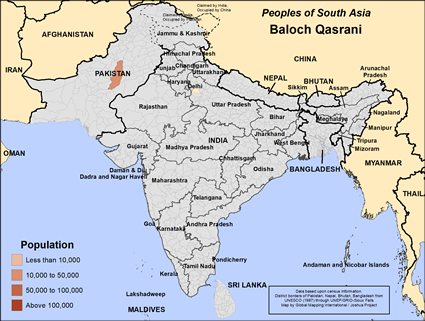The Eastern Baloch are part of a much larger population of Baloch. The various Baloch subgroups such as the Qasrani speak different languages, each with distinguishing characteristics. The Baloch homeland reaches from eastern Balochistan to southwestern Punjab, which borders India. This high, dry region was once a very populated country watered by a large number of flowing rivers. Today, it is a barren area of rocky mountains and dry river valleys mixed with desert land. Their name, "Baloch," is shrouded in controversy. Some say it means "nomad," while others claim that it is an old Persian word meaning "the cock's crest." Their history is just as mysterious. Some have traced their origins to Nimrod, son of Cush (Noah's grandson). But while some things are uncertain, we do know that they first moved to the region in the twelfth century. During the Moghul period, this territory became known as "Balochistan."
The Qasrani Baloch traditionally earn their living by a combination of farming and semi-nomadic shepherding. They usually raise sheep, cattle or goats. Agriculture is limited because of the harsh climate; nevertheless, it plays a large role in the economy. Their chief crop is wheat. To aid in the household economy, some farmers raise chickens. They also depend on wild fruits and vegetables. One wild plant, called the "dwarf palm," is used as a dietary supplement. The meat of the palm is eaten, and the leaves are used to make ropes, shoes, mats, spoons, tents, and pipes. Techniques of survival differ from valley to valley and from high mountain areas to lowland plains. However, each community tries to keep as many different animals as possible and to grow a wide variety of crops. The Qasrani Baloch have overcome the obstacles of living in an extremely harsh, arid climate. Today, most of them live in two types of settlements that are conducive to their semi-nomadic lifestyle. Their permanent villages consist of clusters of mud houses, loosely organized around the home of the local chief. They live in these mountain and valley settlements in the summertime. However, in winter, they migrate to the plains and coastal areas, seeking green grass for their livestock. During this time, they live in tents, and move freely across the landscape as weather conditions dictate. These temporary settlements are smaller, consisting of closely related kin. Baloch marriages are arranged between the bride's father and the prospective groom. There is a "bride price" of livestock and cash. Once a woman is married, she passes from the authority of her father to that of her husband. Marriages are monogamous and lifelong, and marrying a non-Baloch is strictly forbidden. Balochmayar, or the "Balochiway," is the honor code by which the Qasrani Baloch live. These principles include extending hospitality and mercy, dealing with each other honestly, and offering refuge to strangers. They are preserved through both songs and poetry. Children learn proper behavior by watching their elders and are taunted whenever they misbehave. Many Baloch cannot read or write and until recently, their language was unwritten. However, they have a long tradition of poetic compositions. Poets and professional minstrels are highly regarded.
The Qasrani Baloch are Sunni Muslims. Their religious practices remain private, and there is no concept of a "state religion" among them like there is for most other Pakistani peoples. All forms of secular authority are separated from the spiritual authority held by religious leaders.
The Baloch have been isolated for many years due to harsh climate, the difficulty of communicating in mountainous terrain, and their former reputation as bandits. Since the governments of Iran, Afghanistan, and Pakistan all have a share in Balochistan's welfare, they have begun building roads and developing agriculture programs. However, the Baloch have remained largely unaffected by these developmental changes.
Pray for Holy Spirit-led workers to go to every Baloch subgroup and lead them into a Disciple Making Movement. Pray for Qasrani Baloch elders to have dreams and visions of the risen Christ that will lead them to open the doors of their community to hear about His glory. Pray for the Lord to give the Qasrani Baloch people a spiritual hunger that will lead them to the cross. Pray for harvesters.
Scripture Prayers for the Baloch Qasrani in Pakistan.
https://en.wikipedia.org/wiki/Qaisrani
https://en.wikipedia.org/wiki/Kaura_Khan_Qaisrani
https://www.dawn.com/news/52416
| Profile Source: Joshua Project |











